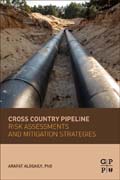
Cross-Country Pipeline Risk Assessments and Mitigation Strategies
Aloqaily, Arafat
Cross-Country Pipeline Risk Assessments and Mitigation Strategies describes the process of pipeline risk management using applicable techniques, such as qualitative risk assessment, consequence modelling/evaluation, pipeline failure rates, and modes and risk calculations, also detailing risk mitigation and control strategies. The potential modes and causes of the failure of pipelines used in the oil and gas industry are evaluated based on a wide range of data that covers more than 40 years of operating history. The book details a consistent approach that allows for the proper estimation of potential risks and how they can be mitigated. The book is an essential resource for professionals and experts involved in pipeline design, but is also ideal for researchers and students studying risk assessment, particularly in relation to pipelines. Offers a practical risk assessment model for pipelines without the need for complicated, expensive softwareDescribes a new and systematic approach for pipeline risk control and mitigation that reflects actual pipeline conditions and operating statusProvides examples of all pipeline hazard identification techniques and how they are used to produce consistent resultsIncludes a newly developed Excel tool that allows users to easily access and use the PipeFAIT tool INDICE: 1. Background and Historic Perspective 2. Identification of Hazards Associated with Pipelines 3. Introduction to Pipeline Risk Assessments 4. Consequence Modeling 5. Pipeline Failure Mode and Frequency 6. Pipeline Quantitative Risk Assessment 7. Pipeline Process Safety Management
- ISBN: 978-0-12-816007-7
- Editorial: Gulf Professional Publishing
- Encuadernacion: Rústica
- Páginas: 212
- Fecha Publicación: 01/07/2018
- Nº Volúmenes: 1
- Idioma: Inglés
